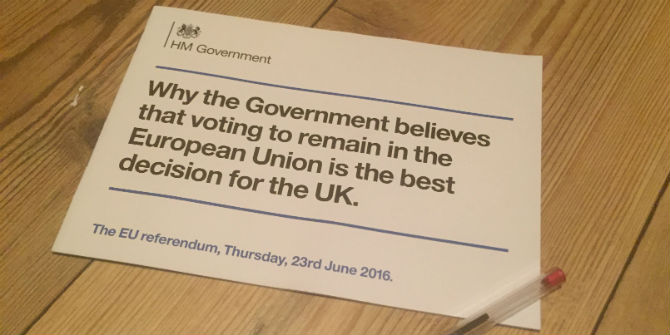 Tony Hockley offers an overview of Jeremy Hunt’s term as Secretary of State for Health and Social Care (2012-2018), and concludes that his record makes it hard to describe Hunt as someone who shirks from a challenge.
Tony Hockley offers an overview of Jeremy Hunt’s term as Secretary of State for Health and Social Care (2012-2018), and concludes that his record makes it hard to describe Hunt as someone who shirks from a challenge.
There are good reasons why no previous health minister has stayed in the job as long as Jeremy Hunt. In no area of public service is reform as resisted as in heath, and the public reputation of any reforming minister so consistently destroyed by the health system’s institutional forces. The health brief is widely and quite accurately perceived amongst aspiring ministers as a poisoned chalice, and the almost inevitable pinnacle of a cabinet career. Jeremy Hunt perhaps recognised this when he quickly (but inaccurately) described it as his last ‘big’ job in government?
Given the level of public affection for the NHS and the media power of its professional interest groups, reform is widely followed by a reshuffle of the health minister. A change of face, somewhat bizarrely, takes the heat out of health policy, even with no change of direction.
In the late 1990s, when Stephen Dorrell replaced Virginia Bottomley as Health Secretary, I stayed in the Department as Special Adviser. I bid to do so precisely because we still had much to deliver, particularly in pursuing the reform and prioritisation of primary care, and the associated controversial service reconfigurations. On his first day, Stephen Dorrell made it clear that the policy of reform would not change; yet he was described as a ‘breath of fresh air’ simply for ‘listening’. That Bottomley left in 1995 under a dark cloud and Dorrell left two years later with a reputation enhanced bears testimony both to the value of a short term at health and of a focus on a decent communications strategy.
Both Dorrell and Hunt came to the job with little past interest in health policy. This apparent naivety worried the usual health commentators. Dorrell’s focus was to survive to the election by means of a ‘front foot’ strategy to avoid being a mere punchbag for the usual onslaught: a ministerial ‘listening tour’, a series of policy-light (and therefore popular) papers, and a purely enabling Primary Care Bill ensued. Hunt began with a focus on a laudable campaign to see the NHS finally go paperless through digital revolution, not realising the scale of the challenge. His determination to expose himself and his departmental colleagues to the realities of the ‘front line’ and to real patient concerns quickly saw his focus shift onto safety.
For all the reported scandals of dangerous and inhumane care, not least the eventual inquiries into the situation at Mid-Staffordshire NHS Foundation Trust, and the clear evidence of a widespread tendency to cover-up on mistakes and malpractice, very little had been done. It was simply too difficult. That Jeremy Hunt chose to make a cultural change on safety his core ambition is hugely to his credit. The introduction of a ‘duty of candour’ on NHS professionals was an important and symbolic step towards this cultural change, and is certainly not the usual ‘quick fix’.
The most significant chink in Hunt’s reputation is, of course, the prolonged dispute over the introduction of a new contract for so-called junior doctors. The NHS has long relied on the availability of doctors in training to provide day-to-day care, over very long hours, and in testing circumstances. A realisation that the historic situation was no longer sustainable dawned in the 1990s, and the modernisation of training contracts has progressed slowly ever since. The principles of the latest update were agreed in 2013, soon after Hunt’s arrival. The debate lasted the remainder of his lengthy term in the department.
Two factors added to the challenge of negotiating a new contract. Firstly, for all of his success in securing a pledge of real funding growth for the NHS during a time of cuts, other NHS spending pressures, and Treasury determination on across-the-board public sector pay, meant that a new contract was being introduced with no financial incentive. Every minister since Bevan has softened the unions with cash. Hunt was not allowed this option.
Secondly, Hunt’s commitment to safety led to the conflation of concerns around weekend mortality, based on contemporary analysis, with the new contract’s provisions on weekend shift patterns and rates. Hunt clearly realised that if the subsequent negotiations with the consultants around weekend working were to succeed, then the junior doctors’ contract would need to lay down a marker. But conflicting data on mortality variations added to an already divisive debate, for which both the BMA and Hunt were clearly unprepared. Even before the draft contract was written, social media rumours about substantial pay cuts had taken root and were widely repeated as fact. It is notable that the dispute was formally settled in 2019 once the Treasury loosened the purse strings, but with the details set out and championed by Hunt over the preceding years largely intact.
Having observed many health secretaries over several decades, Hunt appeared the least prone to retreat into trench warfare, fighting blow for blow with the unions. Throughout he focused on the detail of a very complex contract, kept his door open to dialogue (literally bringing picketing doctors in from outside Richmond House), made concessions where they were clearly required, and ceded a role to respected independent mediators where this might help.
Many other ministers may have given up on the whole enterprise, deeming the personal political cost too high. It is a credit to Hunt that he persisted calmly and methodically with the negotiations, despite the unpromising hand he was dealt by the Treasury. All the while he was dealing with the real impact of George Osborne’s policies: an unprecedented sustained squeeze on NHS spending growth, a one-size-fits-all control on public sector pay deals, and a reduced cap on pension pots that would push many doctors into retirement.
When it came to the January 2018 reshuffle most ministers would have leapt at the chance to move. On reshuffle day Hunt demanded to stay, apparently refusing a job-swap with the Business Secretary despite his deep interest in that brief. On top of this he demanded from the Prime Minister an enlargement of his job, to take social care formally into his brief. This was an extraordinary demand given the devastating response to the Conservative’s ‘dementia tax’ in its 2017 manifesto, and cuts on social care spending.
It would be hard to describe Hunt as someone who shirks from a challenge. His willingness to march towards the sound of gunfire is impressive amongst politicians obsessed with daily opinion polls and quick fixes. He is clearly someone who presses on to his goal, not with all guns blazing, but with a willingness to dig into the detail, conceding some battles in order to win a war.
______________
 Tony Hockley is Visiting Senior Fellow in the Department of Social Policy at the LSE. He was a Special Adviser in the Government led by John Major, and Adviser to David Owen, Leader of the Social Democratic Party.
Tony Hockley is Visiting Senior Fellow in the Department of Social Policy at the LSE. He was a Special Adviser in the Government led by John Major, and Adviser to David Owen, Leader of the Social Democratic Party.
All articles posted on this blog give the views of the author(s), and not the position of LSE British Politics and Policy, nor of the London School of Economics and Political Science. Featured image credit: UK Parliament.







